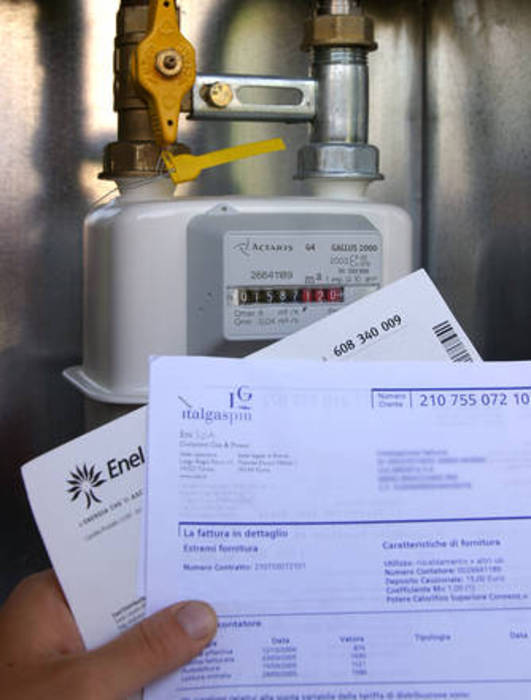Electricity and gas: who really benefits from the price brake
Created: 2023-01-11, 2:45 p.m
By: Hannes Koch, Sebastian Hölzle
Around 850 euros for small households, over 2,000 euros for large households: Gas and electricity customers can expect relief thanks to the energy price brakes.
Is that fair?
Munich – Anyone who consumes a lot of energy will be relieved much more by the gas and electricity price brake than economical private households.
This is proven by sample calculations from our newspaper in cooperation with the consumer advice center (VZ) Baden-Württemberg.
"This shows a social imbalance," said VZ energy expert Matthias Bauer.
The price brake taxation that the federal government is planning for this year could partially solve the problem.
Energy price brake for gas and electricity from 2023: Those who need a lot will be relieved much more
In principle, the price brakes for gas and electricity will take effect from the beginning of 2023. In order to give the energy suppliers the necessary time to implement them, they will not officially come into force until March, but will then apply retrospectively from January 1st.
For 80 percent of the amount consumed in the previous year, suppliers can then only charge private households and companies 12 cents per kilowatt hour (kWh) for natural gas and 40 cents per kWh for electricity.
For higher consumption, the market price applies.
The price brakes save a private household with low consumption by 848 euros per year (see table below).
A household with high consumption benefits with a saving of 2,160 euros.
The more individual energy consumption is reduced, the more the gap grows.
With 80 percent of the previous amount of gas and electricity, a small consumer saves 1,492 euros, but a large consumer saves 3,900 euros.
Energy price brake: Large consumers automatically save more money than small consumers
Because the price reduction per kilowatt hour is the same for all households, large consumers automatically save more money than small consumers.
On the other hand, in many cases this also means that private households with high incomes are more favored than citizens with low incomes.
Because the former often live in large houses or apartments, while the latter have to be content with fewer square meters.
Our graphic shows how high the savings are due to the energy price brake.
© Source: Own calculations, verified by the Baden-Württemberg consumer advice center
Energy experts are calling for an upper consumption limit for the price brake
This raises the question of whether large consumers with high incomes should be subsidized in this way.
"No," said VZ expert Bauer, "above a certain level of consumption, the lower price should no longer apply." Bauer advocates an upper consumption limit for the price brake.
also read
Second heating subsidy: who gets the money – and how much
TO READ
Munich sporting goods retailer insolvent - to save the range is now being radically cut
TO READ
Property tax will rise drastically as early as 2023 – which state will be hit hardest
TO READ
C&A is closing branches again – which locations in Germany are affected?
TO READ
Dispute over new pension plans: Anyone who pays in a lot will be punished
TO READ
Fancy a voyage of discovery?
My space
The federal government is not planning anything like that.
However, the traffic light coalition wants to subject the price brake to a certain extent to income tax.
The savings for high-income households are then treated as taxable income, reducing their benefit.
However, it is unclear when the agreed taxation will take effect.
Energy crisis: suppliers are turning the screw on costs despite the price brake
As published data from the comparison
portal Check24
show, the price brakes are curbing the costs for millions of consumers.
Nevertheless, the utilities are not afraid to keep turning the price screws up - after all, only 80 percent of the previous year's consumption value is capped.
Example electricity: For 2023, despite taking into account the electricity price brake, there are 680 cases of price increases in the basic electricity supply, the portal has determined.
Around 8.8 million households are affected, with an average increase of 38.1 percent compared to September 30th.
Without the electricity price brake, consumers would have had to pay 57.6 percent more in these cases.
Gas price in Germany: Consumers will pay less for many suppliers in 2023
The dampening effect is similar for gas: According to the information, there are 397 cases of price increases in the basic gas supply for 2023, despite the price brake, affecting around 3.2 million households.
Check24
has determined price increases of an average of 25.2 percent compared to September 30th.
But here, too, the data shows that without the price brake, consumers would have had to pay 60.8 percent more than at the end of September.
At the same time, there are gas suppliers who have even lowered their basic supplier tariffs: "With 150 basic gas suppliers, customers will pay less in 2023 than in September 2022, taking into account the gas price brake," according to the experts.
The average relief is 7.1 percent.
Without taking into account the gas price brake, prices would have risen by 20.9 percent.







